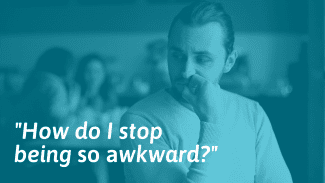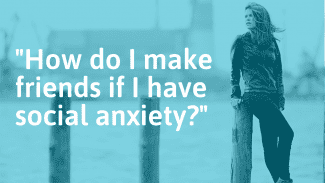“I like staying home instead of going out. I hate bars and sitting in loud, smoky restaurants. I want to meet up with friends after work or at the weekend, but I just hate going anywhere. What can I do?”
Going out with friends feels like it’s supposed to be fun, but it can feel more anxiety-inducing than anything else for some people. If you’re not into partying, finding ways to meet up and do things together can be challenging.
Many people – mostly introverts – don’t enjoy partying that much or are trying to cut down on drinking and be open to trying new things. The problem is that we can often feel blocked and have trouble coming up with ideas. Here are some ideas of things you can do if you don’t like going out.
1. Figure out which parts of going out you dislike
Try to identify the things you don’t like about going out. Is it the large groups of people? The noise? Is it that you don’t like drinking and don’t want to be around drunk people? Perhaps you’re more bothered by people smoking in clubs and bars.
Identifying the specific things that bother you can help you overcome the problem and develop possible solutions.
If you hate going to pubs because of the loud music, you may enjoy going out with the same group of people to a sushi restaurant. If you hate doing things at night because you wake up early, you could try meeting up with people earlier. If you struggle to be around large groups, you may enjoy seeing the same people one-on-one. If you’re too tired after work, you may find that you can enjoy similar activities on the weekend, when you feel more rested.
2. Tell your friends about your preferences
Once you’ve figured out what you disliked about going out, let the people around you know.
Tell your friends that bars aren’t your favorite place but that you’re happy to meet up at other places. If you’re trying to cut down on drinking or are sensitive to smoke, your friends may be open to making adjustments once they know your preferences.
3. Try to go out anyway
Often, we get home from work and don’t feel like going out again. We don’t have the desire to; it feels like a huge chore. Yet if we make an attempt to go out anyway, we often find that we have a good time.
It can be like exercising: we don’t want to get started, but we feel good afterward and are glad we did it.
Don’t shame yourself for not wanting to go out. There’s nothing wrong with how you feel. If you’re not sure if you should make an effort, remind yourself that you don’t have to stay for the whole time. You can go and leave after an hour if you’re not enjoying yourself.
4. Pick and choose the important events to go to
You don’t need to go out with friends to a bar every weekend just because they like having a few beers and watching a live band. Save your “going out” energy for important events, like birthdays, celebrations, and other special occasions. The less you try to force yourself to do things you dislike, the easier it will be emotionally well when you do go.
However, if specific celebrations make you depressed, you might like to get some more specific tips in this article on birthday depression.
5. Discover new hobbies
Social hobbies can be a great way to meet new people. The people you will meet will be likely to have similar interests and values. Some neighborhoods have group projects like shared work sheds where people can lend tools or a community garden where you can learn to grow vegetables and compost food waste.
It’s usually easier to get to know people at events like game nights, hikes, and book clubs rather than pubs and parties. People often attend these types of events with the intention or willingness to meet new people. Also, because it’s not loud, you can have more in-depth conversations and get to know each other faster. If you attend these types of events regularly, you will see the same faces, and people will start to recognize you, too.
6. Create your own events
If you don’t find public events and meetups in your area, consider starting one yourself. While it can be intimidating, it also gives you the benefit of planning out things the way you want. Organizing your own events can be an excellent opportunity to develop valuable social and organizational skills and increase your confidence.
Set up events that sound appealing to you. Perhaps you can see no benefit in drinking beer at a pub – but you can enjoy going hiking with your friends and having a potluck picnic at a beautiful viewpoint? Maybe gathering at someone’s house to watch a documentary and have a deep discussion sounds more your speed.
Don’t be afraid to suggest different activities. Just because your friends enjoy going out, that doesn’t mean that they won’t also enjoy staying in and playing video games together. Make the time and effort to find activities that you can enjoy together with your friends.
7. Immerse yourself in a good book
Spend the night with a good book. Books can teach us new skills, increase our empathy[1], or transport us into a different world. We have a list of book recommendations for introverts. Many good movies and TV shows were based on books that often have more details and depth than the movies can go into. There’s also something enjoyable about browsing through a bookstore and library and picking out different books that call to you.
8. Exercise
Keeping up with workouts can help you stay physically, mentally, and emotionally healthy. Exercising when you’re young will help you stay fit and pain-free later on in life. Being consistent with exercise can also raise your energy levels, making you more likely to want to go out.
Explore different types of exercise to find one that you like. If running isn’t for you, you may enjoy rollerblading and roller derby. Or perhaps boxing or martial arts is more your style. Try different types of classes to see what you like and meet new people.
9. Be a tourist in your city
Take a walk and take different turns than you usually do. Go into shops you have never been to. Pretend you’re a tourist and try to see your neighborhood from an outsider’s perspective. Make it a mission to know your living environment well so that you could give perfect directions if someone asks you.
10. Make healthy lifestyle changes
Your disinterest in going out may be due to low energy and exhaustion. If you’re struggling with low energy, try making some changes to your lifestyle and energy.
Eating a healthier diet and taking supplements can help you increase your energy. You could also consult your doctor and take a blood test to see if you are deficient in any vitamins or minerals.
Getting enough sleep can do wonders for your energy levels and emotional health. Improve your sleep quality by avoiding screens for an hour before bedtime and adopting bedtime routines like drinking tea, stretching, journaling, and reading a book.
11. Get help if you have symptoms of depression
If you used to like going out but doing anymore, this might be a sign of depression or social anxiety. A common symptom of depression is anhedonia—the inability to feel pleasure or enjoy things. Your dislike of going out can be isolated, and you may enjoy other things. In that case, it’s probably not a big problem. But if you can’t find other things you enjoy doing and have other symptoms of depression, you may want to consider seeking professional help.
A therapist can help you understand why you dislike going out and how to handle the problem. They can help you recognize and challenge limiting beliefs about yourself (such as “I’m not good at things like that” or “I’m not interesting”) and practice new tools and skills. You can find an online therapist through BetterHelp.
Common questions about going out
Why don’t I feel like going out?
You may not feel like going out if you feel burnt out, anxious, depressed, or exhausted. Not wanting to go out may be a temporary phase you’re going through, or you may be an introvert that prefers to meet people one-on-one in quiet places.
What can I do instead of partying?
You can spend time getting to know yourself and your friends on a deeper level. You can use the time to develop new skills and knowledge or explore the area you live in. Volunteer, cook, or catch up on a TV show — in short, do whatever you feel like doing!









1. You (conveniently?) didn’t answer the question what to do when you hate going out because of cigarette smoke. No, it’s not just because I am bothered by it, it is literally painful to me and makes me immensely sick! If you don’t know how, picture a stoner with deep red eyes who is also having the flu, this is how I look like after being exposed to cigarette smoke for two hours.
2. I live in a country I did not grow up in, I do not have any friends here. I cannot ask anybody to go to places where people don’t smoke because I have nobody to ask. And my colleagues at work couldn’t give a damn, they all have families to spend their time with.
3. Oh, I do go out anyway occasionally, and every time I regret it! I live in Europe, it’s impossible to go out without being exposed to cigarette smoke, even when it’s forbidden to smoke inside because smokers go exactly as far as they legally have to, which is exactly in front of the entrance door, there they cluster together and all the cigarette smoke goes inside anyway every time somebody goes in or out.
4. I do pick “the important events” to go out, but being picky doesn’t help in (a) having a social life, (b) making friends, (c) finding a partner. So I shouldn’t be picky? Then we’re back at problems 1., 2. and 3.
5. Social hobbies work poorly here because locals already have their own friends and are not interested in making new friends. I tried doing team sports: people come at the start of the play and then immediately go back home afterwards, except for the ones that like drinking and smoking cigarettes, which brings us back to what I do not enjoy. (In fairness, social hobbies is still the only suggestion in that list that could eventually show some fruit. In theory.)
6.-11. None of that helps in solving problems 4.(a), (b) or (c).